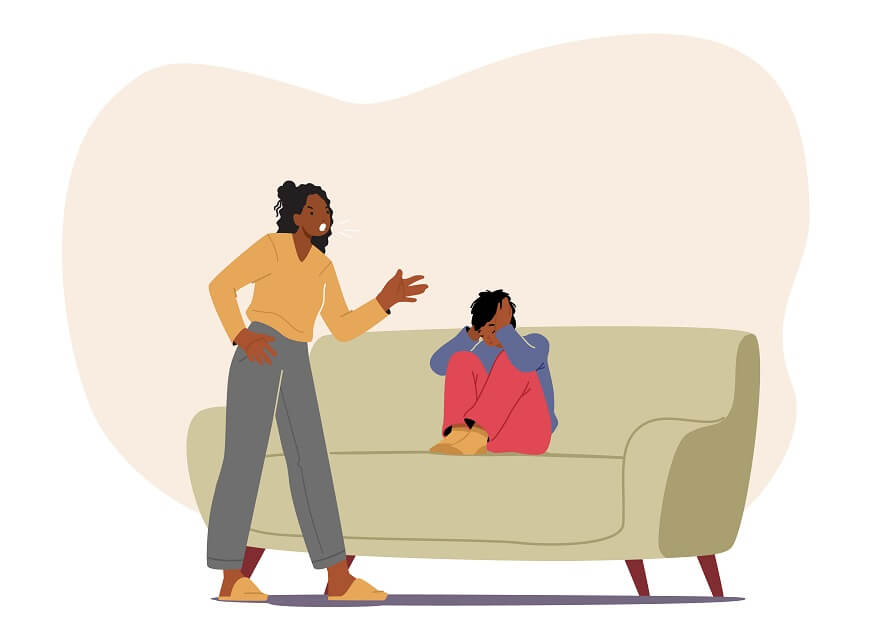Bullying among children encompasses a pattern of deliberate and aggressive actions, characterised by an imbalance of power between the child who engages in bullying behaviour and the child who becomes the target. This harmful behaviour commonly arises within a relational dynamic where one child utilises their perceived power to exert control, intimidate, or inflict harm upon another child.
How to react if your child is bully
Finding out that your child is a bully can be upsetting, but it’s important to handle the situation in a calm and thoughtful manner. Here’s what you can do:
Stay Calm: It’s natural to feel a mix of emotions, including disappointment, anger, or even guilt. However, it’s important to maintain your composure. Acting out of anger may escalate the situation and make it harder to address.
Gather Information: Try to learn more about the situation before confronting your child. Speak with teachers, parents, and even other kids if possible. This will give you a better understanding of the bullying incidents.
Talk To Your Child: Have an open, non-accusatory conversation with your child. Ask about their side of the story before making any assumptions. Make sure they understand what bullying is and why it’s unacceptable.
Show Empathy and Understanding: If your child admits to bullying, it’s essential to show empathy. They must feel safe to express their feelings and thoughts. Sometimes, kids bully because they are dealing with their own problems, so try to find out if there’s any such issue.
Set Clear Expectations and Consequences: Make sure your child understands that bullying behaviour is unacceptable. Establish what the consequences will be if they continue to act in such a way. Make sure the consequences are reasonable, proportionate, and consistently enforced.
Teach Empathy and Respect: Encourage empathy by helping your child imagine how their actions affect others. You can use role-playing or hypothetical scenarios. Teach them the importance of respecting others and their feelings.
Seek Professional Help: If the bullying continues, it might be helpful to involve a counsellor, psychologist, or other mental health professional. They can provide guidance on how to effectively address the issue.
Follow-up: Stay connected with your child’s teachers and school officials to ensure that the bullying has stopped. Ask your child about their behaviour regularly to ensure they are making progress.
Remember that this is a chance for growth and learning for your child. With your guidance and support, they can learn to change their behaviour.
Also Read: How to Prevent Bullying in Schools
Tips for parents to not lose patience
Addressing bullying behaviour in a child requires patience, understanding, and firmness. Here are some steps you can take:
Communication: Have an open and honest conversation with your child about their behaviour. Make sure to provide specific instances of when they acted as a bully. It’s essential to explain why this behaviour is harmful not just to others but to them as well.
Establish clear rules and consequences: Make it clear that bullying is unacceptable. Establish what the consequences will be if they continue to engage in such behaviour and ensure that these consequences are proportionate, reasonable, and consistently enforced.
Find out the reasons: Bullying can sometimes be a sign of other underlying issues. It could be because they are struggling with self-esteem issues, are bullied themselves, or are having difficulty coping with feelings or problems. They might also be learning this behaviour from someone else. It could be useful to get a counsellor or psychologist involved to help discover the root cause.
Develop empathy: Encourage empathy and kindness. Help them understand how their actions might make others feel by asking questions like, “How would you feel if someone did that to you?”
Teach them alternatives: Encourage your child to express their feelings and frustrations in a positive and constructive way. Teach them communication and social skills that promote respect and understanding.
Get professional help: If the behaviour persists or if it’s causing significant distress for your child or others, it may be time to seek help from a mental health professional. They can provide strategies and interventions to address bullying behaviour.
Stay involved: Stay connected with your child’s teachers and school officials to monitor the situation. It’s also important to maintain an open line of communication with your child. Regularly ask about their day, their feelings, and their relationships with peers.
Remember, changes will not happen overnight and it’s important to be patient with your child while they are learning to modify their behaviour. It’s equally important for them to understand that you’re there to support and guide them through this process.
Also Read: Reasons Why Children Steal: Understanding the Motivations and How to Address Them
Should you threaten your child?
Do not threaten your child to not bully. Threatening your child will not solve the problem. In fact, it may make it worse. Instead, you should focus on teaching your child about the importance of empathy and respect. You should also help them develop coping mechanisms for dealing with their anger and frustration in a healthy way. Here are some tips for talking to your child about bullying:
- Start by explaining what bullying is. Help your child understand that bullying is not just about name-calling or physical violence. It can also include things like spreading rumours, excluding others, or making threats.
- Talk about the impact of bullying. Explain to your child that bullying can have a serious impact on the victim, both emotionally and physically.
- Teach your child about empathy. Help your child understand how their actions might make others feel.
- Help your child develop coping mechanisms. Teach your child healthy ways to deal with their anger and frustration, such as taking a break, counting to ten, or talking to a trusted adult.
- If your child is already bullying others, it is important to take action. Talk to your child about their behaviour and the consequences of their actions. You may also need to involve the school or other authorities.
Here are some things to avoid when talking to your child about bullying:
- Do not threaten your child. This will only make them more likely to bully others.
- Do not blame the victim. It is never the victim’s fault that they are being bullied.
- Do not minimise the problem. Bullying is a serious issue and it should be taken seriously.
- Do not give up. It may take time and effort, but you can help your child learn to stop bullying and treat others with respect.
Also Read: Panic attack in teenagers: Causes, Symptoms, Treatment
Euroschool has a zero-tolerance policy on bullying and is committed to creating a safe and supportive environment for all students. We believe that everyone has the right to feel safe and respected at school.










